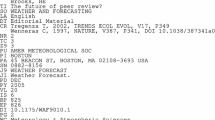Abstract
Peer review plays an important role in maintaining the quality of science. Selection of peers is at the heart of the process by which science advances. Editors and others responsible for selecting a group of peers often rely on their position in a network by which experts in a field are linked to one another by bonds of common interest and recognized expertise. In this paper, we report one aspect of a study aimed at characterizing the structure of this network: the asymmetry of the fraction of experts receiving varying numbers of nominations as experts by peers. The distribution of such nominations is very skew, and we have found that a law of cumulative advantage provides the best theoretical approximation for the distribution of nominations, expecially when the overall pool of data is broken down into well-defined specialties.
Similar content being viewed by others
References
M. KOCHEN, Quality Control in the Publishing Process and Theoretical Foundations for Information Retrieval, in: J. TOU (Ed.),Software Engineering, Vol. 2 Academic Press, New York, 1971; M. KOCHEN, B. PERKEL, Improving Referee Selection and Manuscript Evaluation, in: M. BALABAN (Ed.),Scientific Information Transfer: The Editor's Role Reidel, Dordrecht, Holland, 1978.
D. LINDSEY,The Scientific Publication System in Social Science. Jossey-Bass, San Francisco, 1978.
J. COLE, S. COLE,Social Stratification in Science. University of Chicago Press, Chicago, 1973; and Which Researcher Will Get the Grant?Nature, 279 (1979) June 14.
R. C. ANDERSON, F. NARIN, P. McALLISTER, Publication Ratings vs. Peer Ratings of Universities,Journal of the American Society for Information Science, 29 (1978) 91–103.
S. CRAWFORD, Informal Communication Among Scientists in Sleep Research,Journal of the American Society for Information Science, 22 (1971) 335–352; D. CRANE,Invisible Colleges. University of Chicago Press, Chicago, 1972.
R. K. MERTON, H. ZUCKERMAN, Age, Aging, and Age Structure in Science, in: R. K. MERTON (Ed.),The Sociology of Science, University of Chicago Press, Chicago, 1973, 497–560.
op.cit., note 1.
M. KOCHEN, A. BLAIVAS, A Model for the Growth of Mathematical Specialties,Scientometrics, 3 (1981) 265.
COLE, COLE, DIETRICH, Measuring the Cognitive State of Scientific Disciplines, in: Yehuda ELKANA (Ed.),Toward a Metric of Science. John Wiley & Sons, New York, 1978, 209–252.
R. K. MERTON, The Matthew Effect in Science,Science, 159 (1968) 56–63; alsoThe Sociology of Science University of Chicago, Chicago, 1973; D. de SOLLA PRICE, Cumulative Advantage Games Explained: A Reply to Kantor,Journal of the American Society for Information Science, 29 (1978) 204–206.
F. EGGENBERGER, G. POLYA, Ueber die Statistik Verketteter Vorgaenge,Zeitschrift fuer Angewandte Mathematik und Mechanik, 3 (1923) 279–289.
M. GREENWOOD, G. V. YULE, An Inquiry into the Nature and Frequency Distributions Representative of Multiple Happenings,Journal Royal. Stat. Soc., 83 (1920) 255–279.
N. L. JOHNSON, S. I. KOTZ, Negative Binomial Distribution, Ch. 5,Discrete Distributions Wiley-Interscience 1970.
M. KOCHEN,Some Problems in Information Science, Scarecrow, Metuchen, 1965.
C. KADUSHIN,The American Intellectual Elite, Little and Brown, Boston, 1974.
Author information
Authors and Affiliations
Rights and permissions
About this article
Cite this article
Kochen, M., Crickman, R. & Blaivas, A. Distribution of scientific experts as recognized by peer consensus. Scientometrics 4, 45–56 (1982). https://doi.org/10.1007/BF02098005
Received:
Revised:
Issue Date:
DOI: https://doi.org/10.1007/BF02098005




